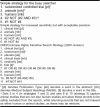How to identify randomized controlled trials in MEDLINE: ten years on
- PMID: 16636704
- PMCID: PMC1435857
How to identify randomized controlled trials in MEDLINE: ten years on
Erratum in
- J Med Libr Assoc. 2006 Jul;94(3):354
Abstract
Objective: The researchers sought to assess whether the widely used 1994 Cochrane Highly Sensitive Search Strategy (HSSS) for randomized controlled trials (RCTs) in MEDLINE could be improved in terms of sensitivity, precision, or parsimony.
Methods: A gold standard of 1,347 RCT records and a comparison group of 2,400 non-trials were randomly selected from MEDLINE. Terms occurring in at least 1% of RCT records were identified. Fifty percent of the RCT and comparison group records were randomly selected, and the ability of the terms to discriminate RCTs from non-trial records was determined using logistic regression. The best performing combinations of terms were tested on the remaining records and in MEDLINE.
Results: The best discriminating term was "Clinical Trial" (Publication Type). In years where the Cochrane assessment of MEDLINE records had taken place, the strategies identified few additional unindexed records of trials. In years where Cochrane assessment has yet to take place, "Randomized Controlled Trial" (Publication Type) proved highly sensitive and precise. Adding six more search terms identified further, unindexed trials at reasonable levels of precision and with sensitivity almost equal to the Cochrane HSSS.
Conclusions: Most reports of RCTs in MEDLINE can now be identified easily using "Randomized Controlled Trial" (Publication Type). More sensitive searches can be achieved by a brief strategy, the Centre for Reviews and Dissemination/Cochrane Highly Sensitive Search Strategy (2005 revision).
Figures
Comment in
-
Response to Glanville et al.: How to identify randomized controlled trials in MEDLINE: ten years on.J Med Libr Assoc. 2007 Apr;95(2):117-8; author reply 119-20. doi: 10.3163/1536-5050.95.2.117. J Med Libr Assoc. 2007. PMID: 17443240 Free PMC article. No abstract available.
-
Response to Glanville et al.J Med Libr Assoc. 2007 Apr;95(2):118-9; author reply 119-20. J Med Libr Assoc. 2007. PMID: 17443241 Free PMC article. No abstract available.
Similar articles
-
Optimizing search strategies to identify randomized controlled trials in MEDLINE.BMC Med Res Methodol. 2006 May 9;6:23. doi: 10.1186/1471-2288-6-23. BMC Med Res Methodol. 2006. PMID: 16684359 Free PMC article.
-
Which are the most sensitive search filters to identify randomized controlled trials in MEDLINE?J Med Libr Assoc. 2020 Oct 1;108(4):556-563. doi: 10.5195/jmla.2020.912. J Med Libr Assoc. 2020. PMID: 33013212 Free PMC article.
-
The sensitivity and precision of search terms in Phases I, II and III of the Cochrane Highly Sensitive Search Strategy for identifying reports of randomized trials in medline in a specific area of health care--HIV/AIDS prevention and treatment interventions.Health Info Libr J. 2007 Jun;24(2):103-9. doi: 10.1111/j.1471-1842.2007.00698.x. Health Info Libr J. 2007. PMID: 17584213
-
Handsearching versus electronic searching to identify reports of randomized trials.Cochrane Database Syst Rev. 2007 Apr 18;2007(2):MR000001. doi: 10.1002/14651858.MR000001.pub2. Cochrane Database Syst Rev. 2007. PMID: 17443625 Free PMC article. Review.
-
Identifying additional studies for a systematic review of retention strategies in randomised controlled trials: making contact with trials units and trial methodologists.Syst Rev. 2017 Aug 22;6(1):167. doi: 10.1186/s13643-017-0549-9. Syst Rev. 2017. PMID: 28830570 Free PMC article. Review.
Cited by
-
An exploration of available methods and tools to improve the efficiency of systematic review production: a scoping review.BMC Med Res Methodol. 2024 Sep 18;24(1):210. doi: 10.1186/s12874-024-02320-4. BMC Med Res Methodol. 2024. PMID: 39294580 Free PMC article. Review.
-
Lubricating drops for contact lens discomfort in adults.Cochrane Database Syst Rev. 2024 Sep 5;9(9):CD015751. doi: 10.1002/14651858.CD015751.pub2. Cochrane Database Syst Rev. 2024. PMID: 39234924
-
Trifocal versus extended depth of focus (EDOF) intraocular lenses after cataract extraction.Cochrane Database Syst Rev. 2024 Jul 10;7(7):CD014891. doi: 10.1002/14651858.CD014891.pub2. Cochrane Database Syst Rev. 2024. PMID: 38984608
-
International Collaboration and Commercial Involvement in Randomized Controlled Trials From 10 Leading Countries, 1997 Through 2019.Cureus. 2024 May 27;16(5):e61205. doi: 10.7759/cureus.61205. eCollection 2024 May. Cureus. 2024. PMID: 38939267 Free PMC article. Review.
-
Interventions to increase time spent outdoors for preventing incidence and progression of myopia in children.Cochrane Database Syst Rev. 2024 Jun 12;6(6):CD013549. doi: 10.1002/14651858.CD013549.pub2. Cochrane Database Syst Rev. 2024. PMID: 38864362 Review.
References
-
- The Cochrane Collaboration. The Cochrane library. [Web document]. Chichester, UK: John Wiley & Sons, 2005. [cited 10 Oct 2005]. <http://www.thecochranelibrary.com>.
-
- Agency for Healthcare Research and Quality. Technology assessments. [Web document]. Rockville, MD: The Agency, 2005. [cited 24 Mar 2005]. <http://www.ahcpr.gov/clinic/techix.htm>.
-
- Clinical evidence. London, UK: BMJ Books, 2005.
-
- American College of Physicians. ACP journal club. [Web document]. Philadelphia, PA: The College, 2005. [cited 10 Oct 2005]. <http://www.acpjc.org/?hp>.
-
- Lefebvre C. Identification of randomized controlled trials using MEDLINE: the situation in 1993. In: An evidence-based health care system: the case for clinical registries. Bethesda, MD: National Institutes of Health, Office of Medical Applications of Research, 1993:23–8.
Publication types
MeSH terms
LinkOut - more resources
Full Text Sources



